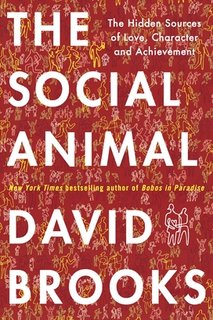
10 Mar 2011 01:43:29
His new book, "The Social Animal," says scientists have begun a "revolution in consciousness."
Brooks writes that a core finding of their work is that we aren't primarily the products of our conscious thinking, but of thinking that happens below the level of awareness.
He creates fictional characters to illustrate.
"Let's say someone touches your hand across a restaurant table. Instantly, the mind is searching the memory banks for similar events. The touch of the hand has been felt and refelt .... The body has reacted, plans have been hatched, reactions prepared. And all this complex activity has happened under the surface of awareness and in the blink of an eye."
He writes that this process also happens in the supermarket when you scan an array of cereal boxes and at a jobs fair when you look over different career options. The Emotional Positioning System is coating each possibility with emotional value.
At the end of these complex feedbacks, a desire bursts into consciousness to choose that cereal, seek that job or squeeze the hand, to touch this person, to be with this person forever.
It's a lunch date — a decisive one.
More in Entertainment
The New Royals: Insight on Prince William & Kate Middleton's wedding
Full coverage of the royal wedding on Yahoo! News
Complete entertainment coverage
"Rob and Julia licked their lips, leaned forward in their chairs, glanced at each other out of the corners of their eyes and performed all the other tricks of unconscious choreography that people do while flirting," he explains. "Unawares, Julia did the head cant (that) women do to signal arousal, a slight tilt of the head that exposed her neck."
Brook's technique is to interrupt frequently with descriptions of scientific research, often several pages long.
"Later in their relationship," he writes, "Rob and Julia would taste each other's saliva and then collect genetic information. According to famous research by Claus Wedekind of the University of Lausanne, women are attracted to men whose human leukocyte antigen code of their DNA are most different from their own."
Brooks makes an amusing story of it but some readers, including this one, would have been helped by an explanation of just what a human leukocyte antigen is, and how it — presumably — differed between the fictional Rob and Julia.
Brooks writes that a core finding of their work is that we aren't primarily the products of our conscious thinking, but of thinking that happens below the level of awareness.
He creates fictional characters to illustrate.
"Let's say someone touches your hand across a restaurant table. Instantly, the mind is searching the memory banks for similar events. The touch of the hand has been felt and refelt .... The body has reacted, plans have been hatched, reactions prepared. And all this complex activity has happened under the surface of awareness and in the blink of an eye."
He writes that this process also happens in the supermarket when you scan an array of cereal boxes and at a jobs fair when you look over different career options. The Emotional Positioning System is coating each possibility with emotional value.
At the end of these complex feedbacks, a desire bursts into consciousness to choose that cereal, seek that job or squeeze the hand, to touch this person, to be with this person forever.
It's a lunch date — a decisive one.
More in Entertainment
The New Royals: Insight on Prince William & Kate Middleton's wedding
Full coverage of the royal wedding on Yahoo! News
Complete entertainment coverage
"Rob and Julia licked their lips, leaned forward in their chairs, glanced at each other out of the corners of their eyes and performed all the other tricks of unconscious choreography that people do while flirting," he explains. "Unawares, Julia did the head cant (that) women do to signal arousal, a slight tilt of the head that exposed her neck."
Brook's technique is to interrupt frequently with descriptions of scientific research, often several pages long.
"Later in their relationship," he writes, "Rob and Julia would taste each other's saliva and then collect genetic information. According to famous research by Claus Wedekind of the University of Lausanne, women are attracted to men whose human leukocyte antigen code of their DNA are most different from their own."
Brooks makes an amusing story of it but some readers, including this one, would have been helped by an explanation of just what a human leukocyte antigen is, and how it — presumably — differed between the fictional Rob and Julia.

